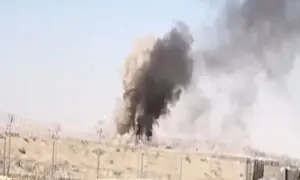Book sheds light on Israel role in destruction of Jerusalem Mughrabi quarter
3 min readAfter the 1967 Six-Day War, Israel planned the "destruction" of Jerusalem's historic Mughrabi neighbourhood at the base of the Western Wall but tried to hide it, according to a book published Friday.
Its author, French historian Vincent Lemire, expects the book "In the Shadow of the Wall: The life and death of the Mughrabi quarter of Jerusalem" to spark controversy because of the sensitive nature of the Holy City.
Lemire, who published several books on the history of Jerusalem, said he drew material from local archives, as well as Ottoman and French ones, for his work released by Le Seuil in Paris.
Most tourists who visit Jerusalem make a stop at the Western Wall plaza, a large esplanade of polished stone that extends from the ancient wall, which according to Jewish tradition is the surviving structure of the Second Temple and the holiest site where Jews can pray.
But before the Six-Day War, when east Jerusalem -- including the old walled city -- was controlled by Jordan, there was no esplanade at the base of the wall.
Instead, there was a Muslim neighbourhood of about 135 homes initially established in the 12th Century by Emperor Saladin, and where iconic Palestinian leader Yasser Arafat lived for a period during his youth.
Lemire, director of the French Research Center in Jerusalem, traces the area's history in a book due to be translated into English later this year by Stanford University Press.
'Definitive proof'
The commonly told story about the fate of Jerusalem's Mughrabi quarter is that immediately after Israel captured the Old City a group of 15 private Jewish contractors destroyed the neighbourhood to make space for the Western Wall plaza.
The role played by then Jerusalem mayor Teddy Kollek in the operation has previously been reported by media outlets.
But Lemire told AFP that his book offers "definitive, written proof on the premeditation, planning and coordination of this operation".
He cites minutes of a meeting between Kollek and the army commander in charge of Jerusalem on June 9, 1967, just 36 hours before the neighbourhood was demolished.
"One of the items on the agenda is the destruction of the Mughrabi quarter," Lemire said.
He said he also consulted an internal foreign ministry note from the same day that prepared talking points to explain the neighbourhood's destruction, "designed to make people believe they were slums and dangerous buildings".
He said he found a note in the Jerusalem municipality's archives that references the need to remove the rubble of the area "on the order of the military command".
International response
Following Israel's creation in 1948, France, the colonial power in most of North Africa at the time, had been a financial supporter of the Mughrabi quarter.
Lemire writes that this was part of a larger regional tactic of currying favour among North African Muslims "to counter the rise of the independence movement in Algeria", then a French colony.
But after Algerian independence in 1962, France "abandoned" the Mughrabi quarter and stayed quiet -- as did several other nations -- as Israel destroyed the area.
Jordan, then a bitter Israeli rival that had just lost control over east Jerusalem, also said nothing, Lemire writes.
"My intuition as a historian is that there was an implicit agreement between the Israelis and the Jordanians," he told AFP.
Jordan was allowed to retain control of the Al-Aqsa Mosque compound, which is above the Western
Wall and is Islam's third holiest site, a post-war concession that may have bought Amman's silence over the Mughrabi quarter's destruction, Lemire said.
He also said displaced residents of the area received "minimal, but fast" financial compensation after the demolition, "to secure their silence".
Lemire told AFP he expected some "hostile" responses to his book, given sensitivities surrounding Jerusalem's holy sites and the "fact that this story is unpleasant for everyone".
But he said he was compelled to write about a neighbourhood that was lacking a recorded history.
"With this book, there's the beginning of a history. It's a start," he said.
For the latest news, follow us on Twitter @Aaj_Urdu. We are also on Facebook, Instagram and YouTube.



























Comments are closed on this story.